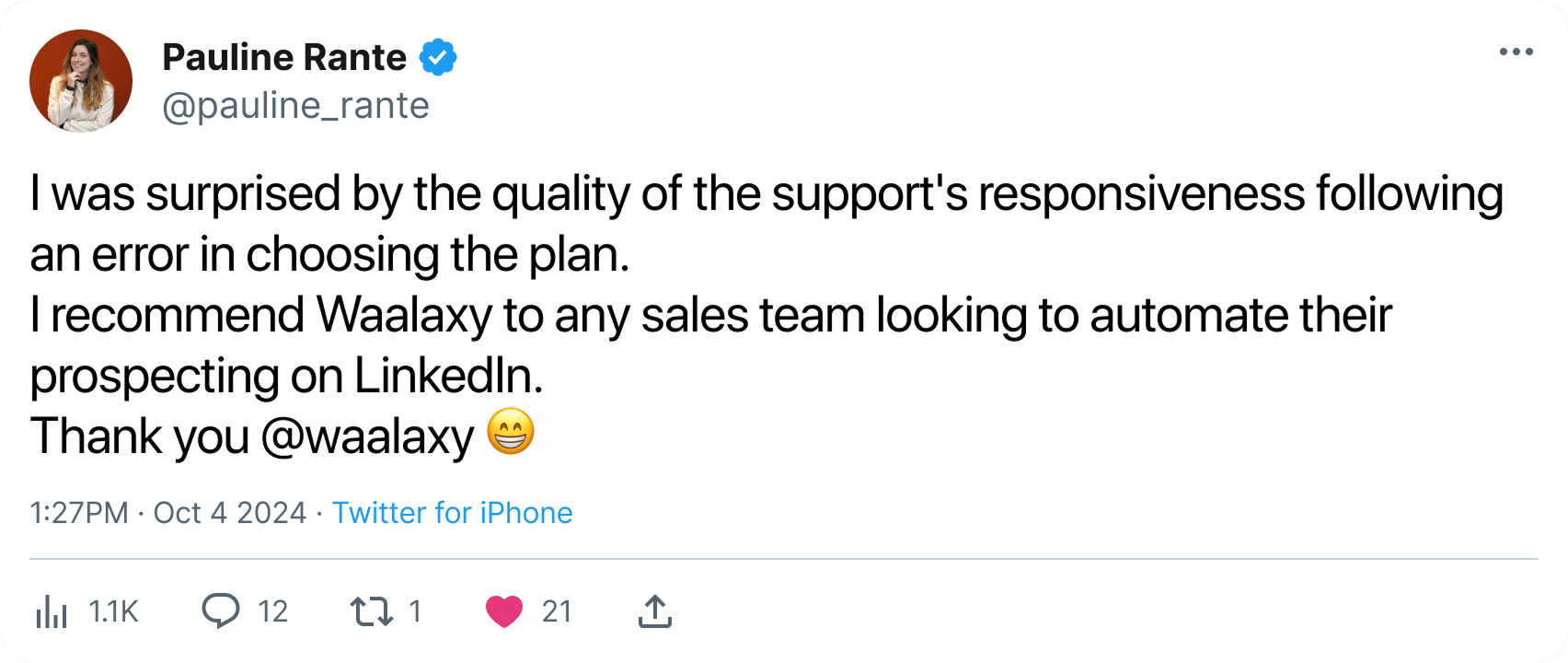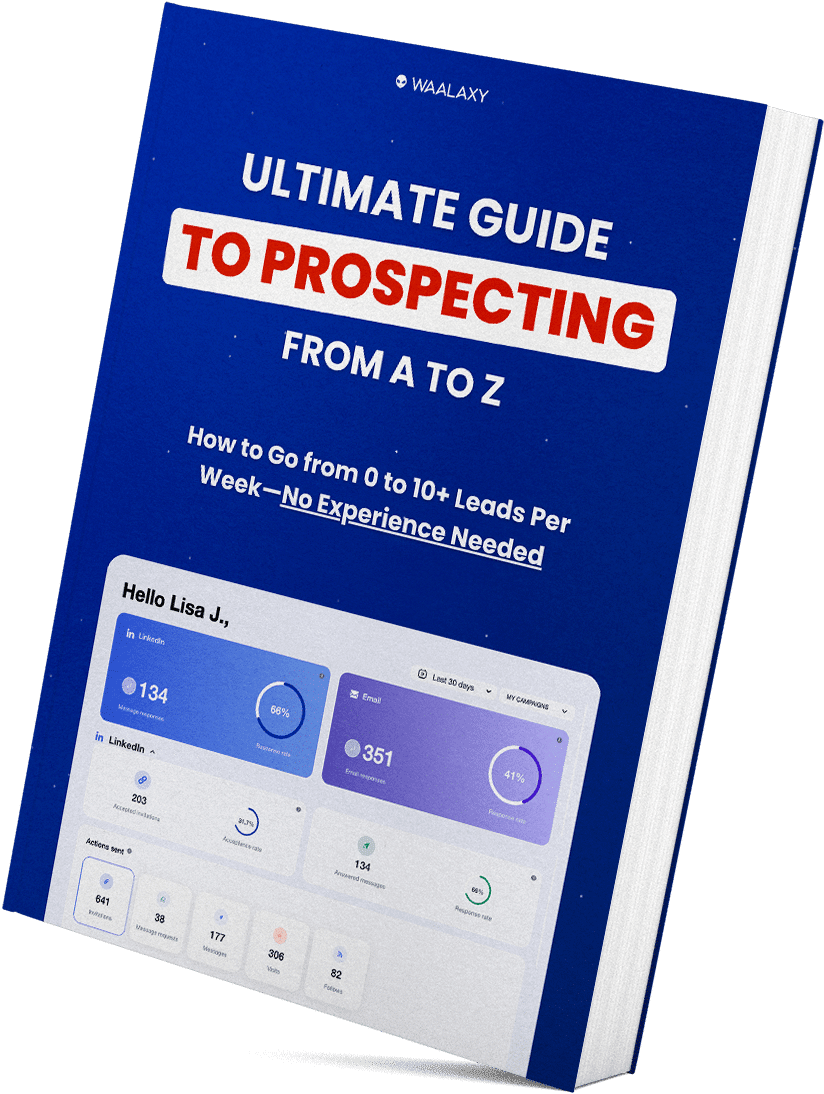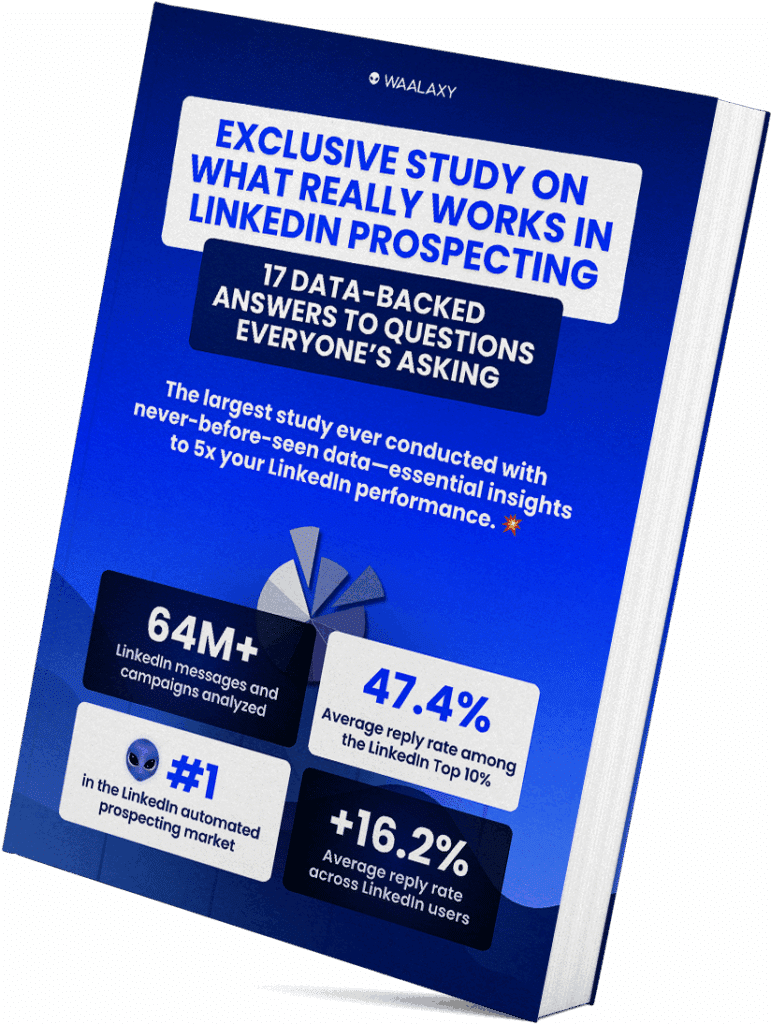- Generational Marketing or Generation X Y Z Alpha : Definition
- Silent generation
- Baby boomers
- Generation x
- Generation Y (millennials)
- Generation Z
- Alpha Generation
- What are the limits of Generational Marketing?
- How can you adapt your marketing strategy to different generations?
- Conclusion: XYZ Generations Table
Do you know what is generational marketing? It’s a classification of births, established on the basis of the particularities, expectations and behaviors that characterize each age group. 👀
In this article, we’ll analyze each generation, from the silent generation to the latest Alpha generation.
Without further ado, let’s get started! ⬇️
Generational Marketing or Generation X Y Z Alpha : Definition
Generational marketing represents a strategy that divides the market into segments, based on consumer age. 👀
Each generation has distinct characteristics, values and behaviors, influenced by the socio-economic and cultural conditions in which they grew up and evolved. 😇
Quickly, although we’ll come back to this in the article, here are the age brackets for each generation:
- 1️⃣ Silent: born between 1928 and 1945.
- 2️⃣ Baby boomers: born between 1946 and 1964.
- 3️⃣ Generation X: born between 1965 and 1980.
- 4️⃣ Millennials (Generation Y): born between 1981 and 1996.
- 5️⃣ Generation Z: born between 1997 and 2012.
- 6️⃣ Generation Alpha: born from 2013 to the present day.
This strategy enables brands to personalize their advertising messages (such as SMSmarketing campaigns), products and services to better meet the specific needs of each age group. 💟
Silent generation
The Silent Generation, also known as “Veterans” or “Traditionals”, includes people born between 1928 and 1945. 📆
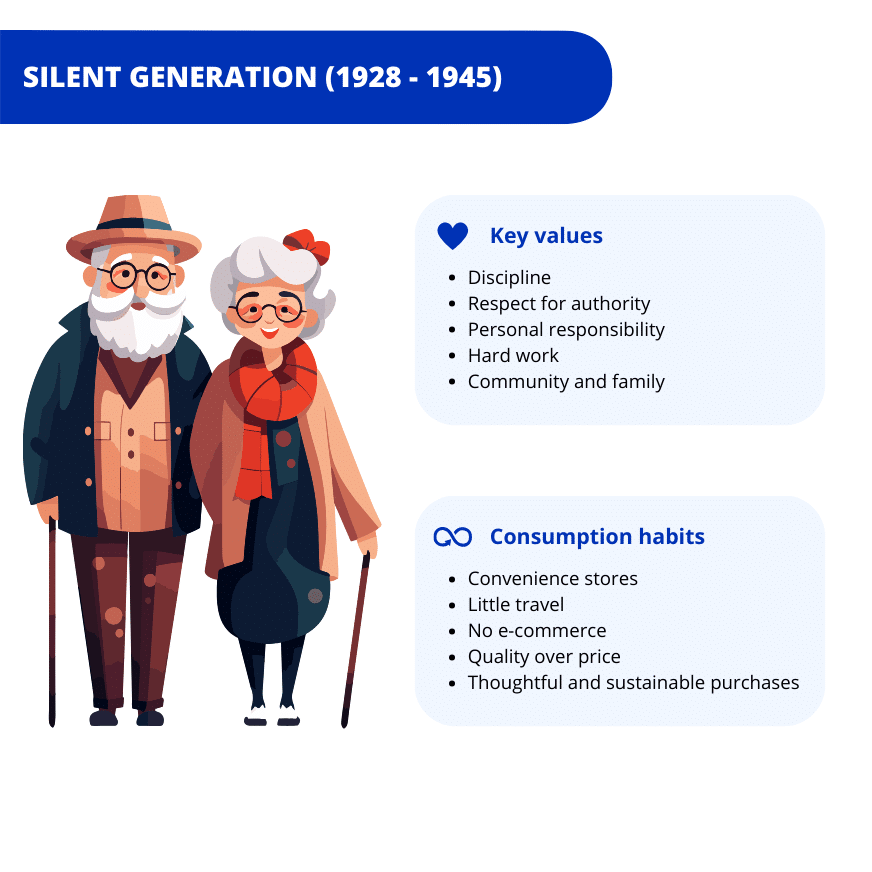
This term comes from the fact that they tend not to stand out, protest or demonstrate for social or political change, unlike the generations that followed them.
In terms of their consumption habits, they look for quality and value rather than price alone.
As a result, they are less likely to be influenced by modern advertising and marketing trends, preferring thoughtful, sustainable purchases.
In addition, here is a short list of their key values: 🔑
- 🟣 Hard work.
- 🔵 Discipline.
- 🟣 Respect for authority.
- 🔵 Dedication to community and family.
- 🟣 Strong sense of personal responsibility.
Thanks to our great-grandparents or grandparents, we learn from their historical experiences and wisdom. 😇
These are the elders of the baby boomers, cherish them. 💟
Baby boomers
Let’s move on to the baby boomer generation, and I don’t mean nails. 💅🏼
This generation includes people born between 1946 and 1964, in the post-war period that saw a significant increase 📈 in the birth rate, hence the name “Baby-boomers”.
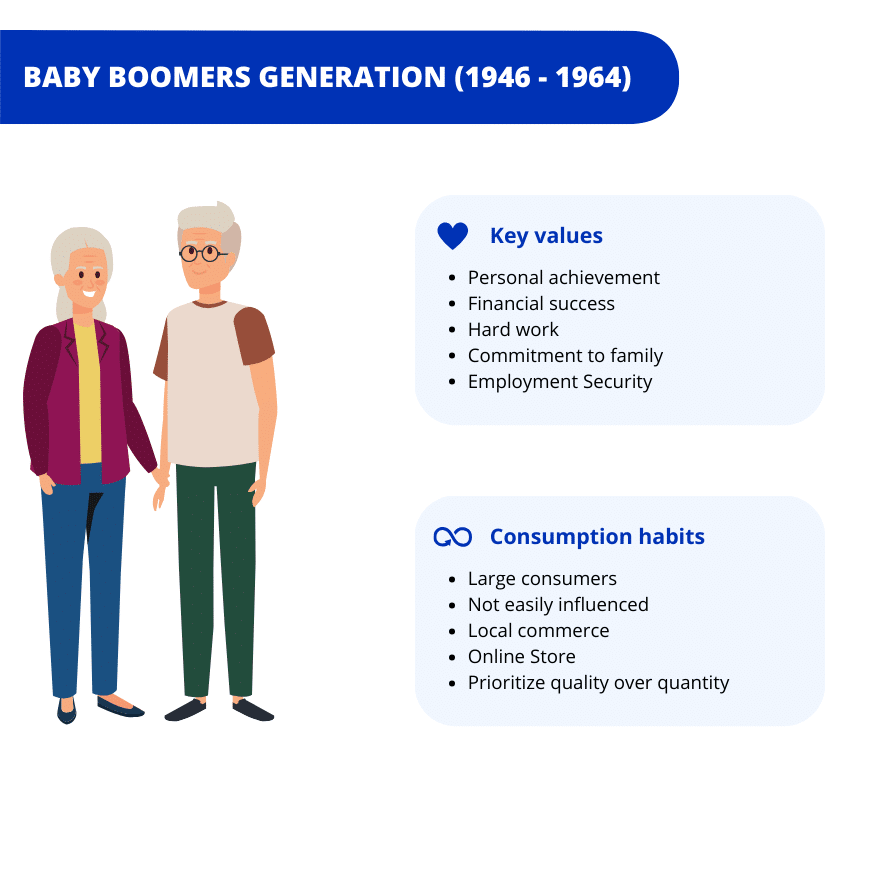
Who are the baby boomers?
These baby boomers are known for their high purchasing power and high levels of consumption.
Indeed, they prioritize the quality and value of the product or service and are less likely to be influenced by trends, ephemeral fads or influencer marketing, unlike younger generations. 👀
Here are a few ideas of their values:
- 🔵 Personal achievement.
- 🟣 Financial success.
- 🔵 Hard work.
- 🟣 Commitment to family.
- 🔵 Job security.
A little history in the making, this generation was responsible for the evolution of social norms such as civil rights, gender equality and educational reform! 💪🏼
But that’s not all: they were the first to adopt our beloved ancestors, the mini-tel, the cell phone or even the personal computer. 😇
Generation x
Often considered the “forgotten middle” between Baby Boomers and Millennials, Generation X has some unique characteristics, which we’re going to find out about right now. 😇
How old is generation x?
This generation represents people born between 1965 and 1980, and the term “Generation X” was popularized by Douglas Coupland’s 1991 book “Generation X: Tales for an accelerated culture”, which recounts the lives and aspirations of this generation at the time.
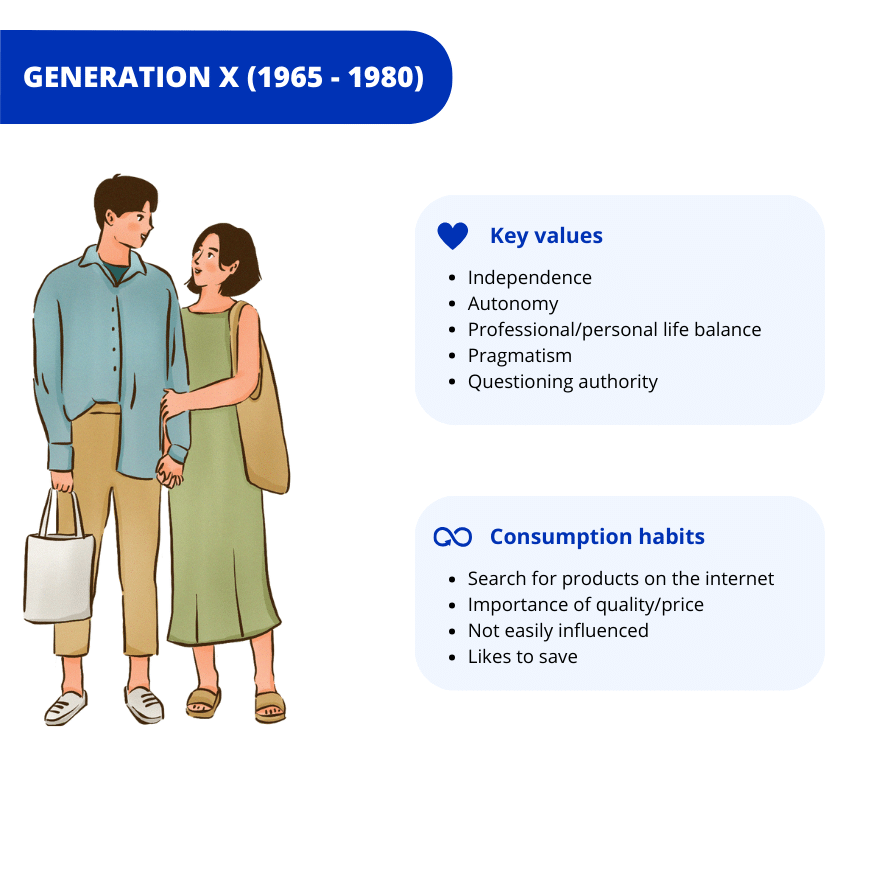
But why X? 🤔
Well, this letter refers to the unknown, symbolizing this generation’s rejection of the labels and ideals of their predecessors, as well as their sense of ambiguity about their place in society. 😅
A quick look 🌍 at their key values: 👇🏼
- Independence.
- Autonomy.
- Desire for work-life balance.
- Diversity.
- Pragmatism.
- Questioning authority.
What are the characteristics of Generation X?
This generation is known for prioritizing product quality and functionality over fashion. Since they reached adulthood before the advent of the Internet in the 2000s, they like to buy in-store. 🛍️
Here are some of their features:
- Adaptability ➡️ Having grown up with technological change, they are very adaptable and comfortable with technology.
- Skepticism ➡️ they are known for their skepticism of the media, political institutions and advertising, preferring to make decisions based on research and facts.
- Spirit of independence ➡️ values independence and freedom of choice, whether in careers, shopping, or lifestyles.
Generation Y (millennials)
The term “Millennials” was popularized by Neil Howe and William Strauss in their book “Millennials Rising: The Next Great Generation” in 2000. 📖
The name refers to individuals who came of age around the millennium, highlighting a new generation with distinct perspectives and experiences. 🙂
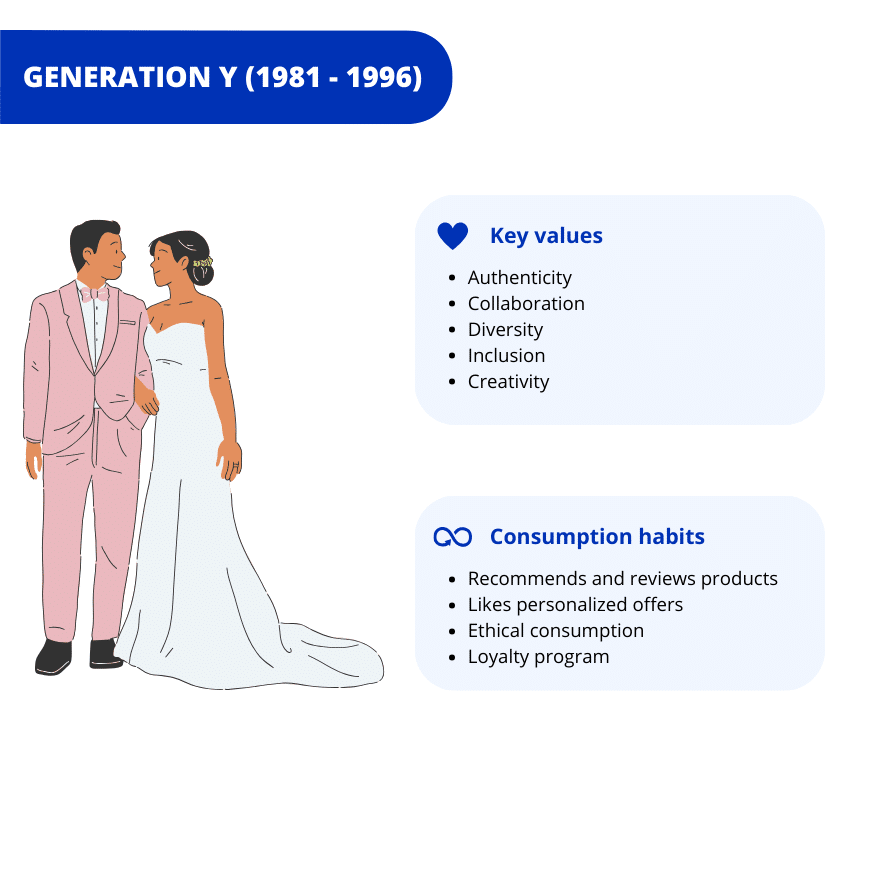
They play a crucial role in transforming workplaces, politics, and culture. 🤩
Here at a glance 👀 their values:
- Authenticity.
- Collaboration.
- Diversity.
- Inclusion.
- Innovation
- Creativity.
Generation Y age
Generation Y is made up of people born between 1981 and 1996 (if you’ve been paying attention, their parents are part of Generation X).
This generation is often characterized by its adaptation to the digital age, its formal education and its unique approach to working life. 👀
What are the characteristics of Generation Y?
Let’s take a look at what makes them different from other generations. 👀
Members of this generation make purchases that add value to their lives, such as travel, cultural events or culinary experiences 🍝.
In addition, they are highly sensitive to ethical and sustainable practices, as they tend to typically support transparent, ethical and socially responsible brands. 🌿
But, what are their expectations? 🤔
Well, they like to have a more flexible work-life balance, with opportunities for personal and professional development, and an inclusive and collaborative work environment.
Finally, here are a few features that distinguish them are rather well for my taste: 👇🏼
- Connectivity ➡️ Digital natives are always connected, using social networks to communicate, inform and influence.
- Flexibility ➡️ they favor flexibility in their working lives, preferring adjustable working hours and the possibility of working remotely.
- Education and training ➡️ strong emphasis on continuous learning and personal development.
Generation Z
The term “Generation Z” logically follows Generation X and Y in continuing the alphabet.
It has been adopted to mark a distinct new era in the generational sequence. 🧪
How old is Generation Z?
This generation was born between 1997 and 2012 and is characterized by its immersion in digital 💻 technology from an early age and by a certain awareness of global issues.
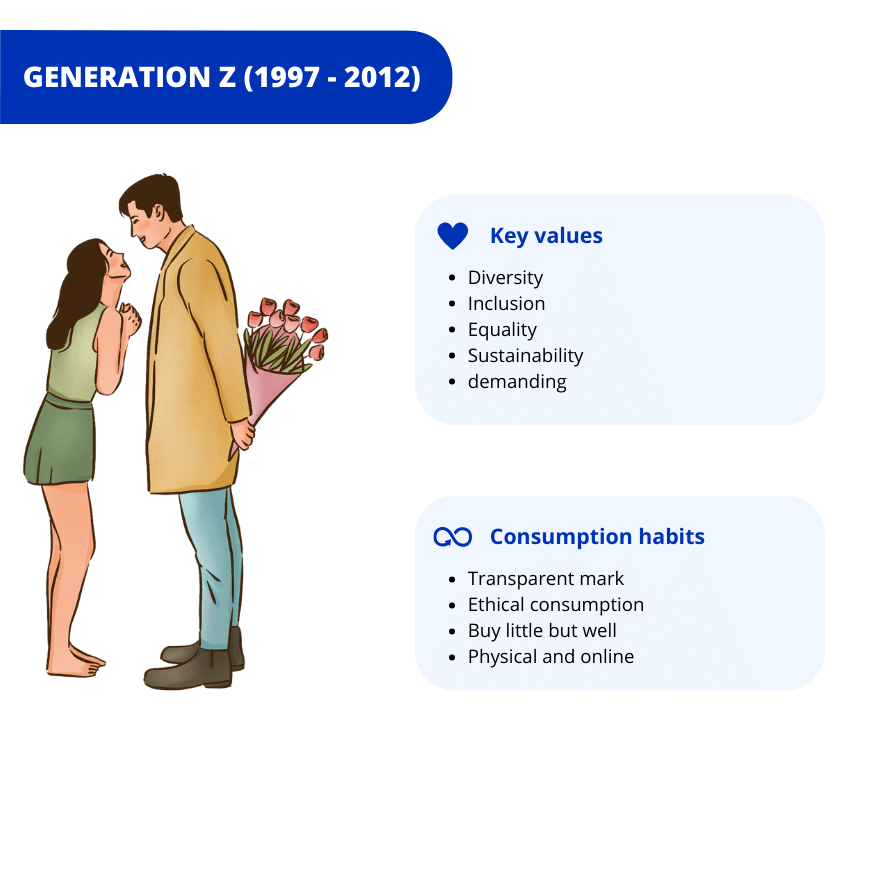
They prefer online shopping and personalized, interactive customer experiences.
Then, like Generation Y, they prefer transparent, ethical and sustainable brands and are influenced by online reviews, influencers and social networks in their purchasing decisions. 💸
Characteristic Z Generation
Members of Gen Z expect a flexible, inclusive and diverse work environment that offers opportunities for personal growth and development.
Indeed, they are very engaged on platforms to promote social change and champion causes they feel are important. 🌍
Diversity, inclusion, equality, and sustainability are the key values of Generation Z.
Here are a few aspects of their personalities: 👇🏼
- Visual and multimedia ➡️ they prefer visual communications (like videos and infographics) and are adept at platforms like Instagram, TikTok, and YouTube.
- Digital natives ➡️ have grown up surrounded by digital technologies, and are extremely comfortable with smartphones, social media and online platforms.
- Pragmatic and realistic ➡️ aware of economic and environmental challenges, they are pragmatic in their approach to education, work, and life.
- Independent and self-reliant ➡️ they value autonomy in their learning and career development, often searching for entrepreneurial opportunities and start-ups.
As you’ll have gathered, this Generation Z embodies change and adaptation, with a thoughtful approach to global challenges. 👀
Alpha Generation
As the name suggests, “Alpha” marks the beginning of a new series of generations, following on from Generation Z.
The choice of the word “Alpha” reflects the idea of a new beginning or a new era in the sequence of generations.
A little culture moment, this term was introduced by Mark McCrindle. 💡
As far as their values are concerned, here is what research suggests: ⬇️
- Inclusiveness.
- Durability.
- Innovation.
- Respect for the environment.
- Diversity.
- Equality.
- Fulfillment.
Why “expected”? Well, these values are taught from an early age, so it’s assumed that they’ll be deeply ingrained in the way they think and act. 💪🏼
Generation Alpha Age
This younger generation refers to children born from 2010 onwards, the first time a generation has been entirely born into the 21ᵉ century and where technology and the internet are ubiquitous.
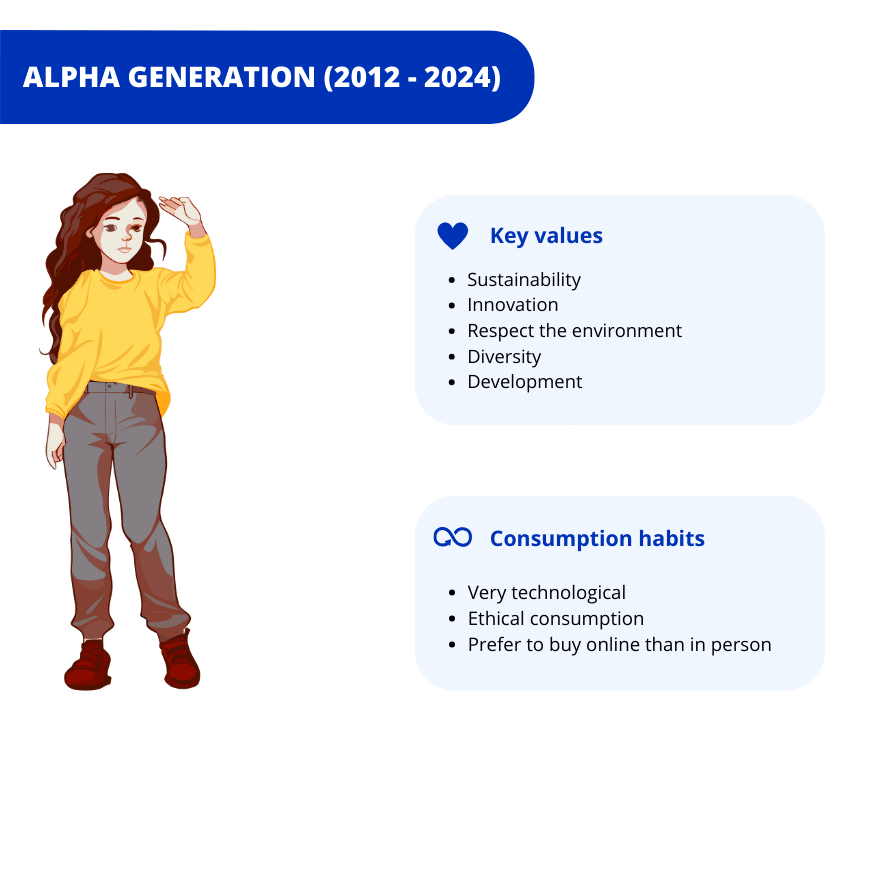
This generation will be even more comfortable with online shopping and digital technologies than other generations.
They are evolving in an environment that is even more technologically integrated in all aspects of their lives, from education, work and leisure to exchanges with their loved ones. 🖤
Alpha Generation: Characteristics
Generation Alpha is in the very early stages of development, which means that impacts and different features will be revealed as we go along. 😇
Let’s take a quick look at the features: 👇🏼
- 🟣 Educated in a digital environment: from an early age, they are exposed to tablets, phones and educational technologies, such as videos on TV or streaming platforms.
- 🔵 Potentially the most educated: thanks to easy access to information and innovative educations, they could be the most educated than any other generation.
- 🟣 Hyper-connected: their whole social and educational life is done with technology, which influences the way they communicate, learn and play.
What are the limits of Generational Marketing?
While generational marketing is handy for targeting 🎯 specific demographics, there can be some limitations… Let’s find out! ⬇️
| The limits of generational marketing | Description |
|---|---|
| Overgeneralizations | Based on generalizations that may ignore the diversity within a generation. |
| Overlapping features | Difficulty in delineating unique strategies due to overlapping characteristics between generations. |
| Rapidly changing trends | Trends change faster than generational periods, making certain strategies obsolete. |
| Impact of socio-economic and cultural factors | Behaviors and values are influenced by socio-economic and cultural factors, not just age. |
| Risks of stereotyping and exclusion | It can lead to campaigns that stereotype or exclude, potentially damaging the brand image. |
| Complexity of intergenerational segmentation | Difficulty applying generalized strategies in multi-generational contexts. |
| Adapting to emerging technologies | Older generations are also embracing new technologies, blurring traditional age-based lines. |
How can you adapt your marketing strategy to different generations?
Since every strategy is different, we recommend that you adopt start-up strategies for each of them.
This is what we’re going to look at right now! ⬇️
1) Silent generation
The silent generation prefers traditional marketing, with media like print (they love to read their newspaper every morning), radio, or even TV for news or documentaries. 📺
Next, we advise you to have outstanding customer service and easily accessible customer support, at the risk of this generation abandoning communication. 🤔
Finally, don’t hesitate to highlight your brand’s history, heritage, and values to echo 📢 traditional values and respect for history. 🙏🏼
2) Boomers: marketing strategy
For baby boomers, here’s what we recommend:
- 1️⃣ Informational content: produce rich, informative content that provides in-depth details and explanations.
- 2️⃣ Emphasize safety and trust: emphasize the safety, reliability, and confidence that your products or services inspire.
- 3️⃣ Value simplicity: make sure your marketing messages are clear, direct, and easy to understand.
3) Generation x: marketing strategy
For Generation X, it’s a little different: 👇🏼
- 1️⃣ Balance digital and traditional: combine digital marketing channels (social networks or email), with traditional media.
- 2️⃣ Value and quality: highlight the quality and value for money of your offers.
- 3️⃣ Promote work-life balance: highlight products or services that facilitate work-life balance.
4) Generation y: marketing strategy
Moving on to Millennials:
- 1️⃣ Social media: actively use social platforms to create authentic dialogues.
- 2️⃣ Prove eco-responsibility: demonstrate your brand’s commitment to sustainability and ethical practices.
- 3️⃣ Offer personalized experiences: leverage data analysis to deliver personalized marketing messages.
5) Generation Z: Marketing Strategy
Gen Z: ⬇️
- 1️⃣ Optimize for mobile: make sure all digital content is mobile-friendly.
- 2️⃣ Use influencers: collaborate with influencers who share your brand values.
- 3️⃣ Promote inclusivity: represent and promote your values.
6) Generation Alpha
Our latest generation, the Alpha: 👇🏼
- 1️⃣ Create interactive and educational content: develop content that is both engaging and offers educational value, adapted for platforms like YouTube Kids.
- 2️⃣ Involve parents in marketing: target both children and their parents.
- 3️⃣ Use suitable platforms: make sure content is accessible and appropriate for young children.
Conclusion: XYZ Generations Table
To conclude, we can say that understanding and appreciating the nuances of generations X, Y and Z is crucial to navigating ⛵️ in today’s marketing and communications landscape.
Indeed, different generations bring their experiences, values, and expectations to the table, offering unique opportunities for brands to connect. 🫱🏽🫲🏾
Now you know all about the generations before and the generations to come.
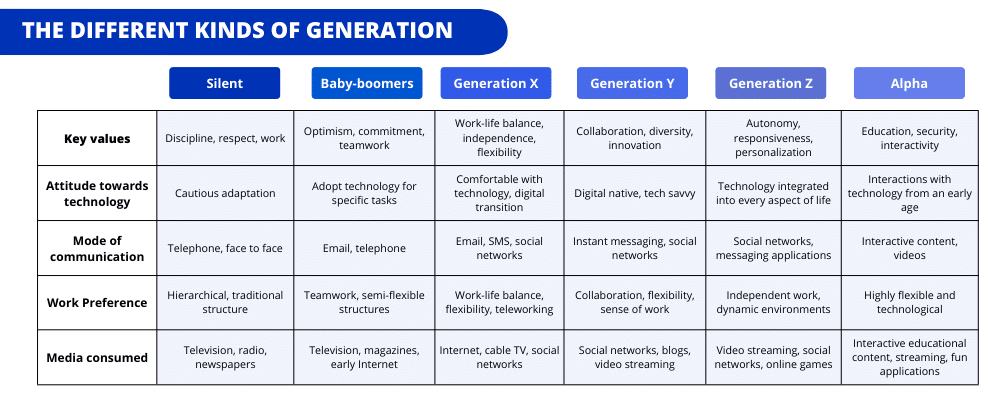
By the way, I don’t know if you noticed, but the images you saw earlier in the article were generated on DALL-E. 👀
FAQ about the Generation X Y Z
Don’t be too hasty, we still have a few resources to share with you. 👇🏼
What are the 7 Generations?
Here are the 7 known generations:
- 1️⃣ Silent: born between 1928 and 1945.
- 2️⃣ Baby boomers: born between 1946 and 1964.
- 3️⃣ Generation X: born between 1965 and 1980.
- 4️⃣ Millennials (Generation Y): born between 1981 and 1996.
- 5️⃣ Generation Z: born between 1997 and 2012.
- 6️⃣ Generation Alpha: born from 2013 to the present day.
- 7️⃣ Generation Beta: to be born after 2025.
What is Generation Beta?
After generation x y z and alpha, the new generation Beta refers to children born after Generation Alpha, born from 2025 and until an undefined future date. 📆
How do you deal with generations X Y Z Alpha?
Cohabitating in corporate life in generational marketing requires an open, inclusive approach that values differences.
Here, for your eyes only, are some strategies you can put in place:
- 💬 Facilitate intergenerational communication: encourage exchanges between generations through team meetings, collaborative projects and even team building activities.
- 🫱🏽🫲🏾 Promoting inclusion and diversity: creating a working environment where every employee, whatever their age, feels valued and included.
- 💪🏼 Capitalize on the strengths of each generation: identify and capitalize on the different strengths of each individual to improve company performance and job satisfaction.
- 📈 Providing tailored professional development opportunities: offering personalized training and career paths that meet the aspirations and development needs of each generation.
- 📖 Adapt work policies: flexible policies in terms of working hours, teleworking, and vacations can help meet these varied needs.
- 🫶🏼 Creating a sense of belonging: fostering a corporate culture that celebrates collective and individual success.
Now you know all about generational marketing! See you soon. 🐉



